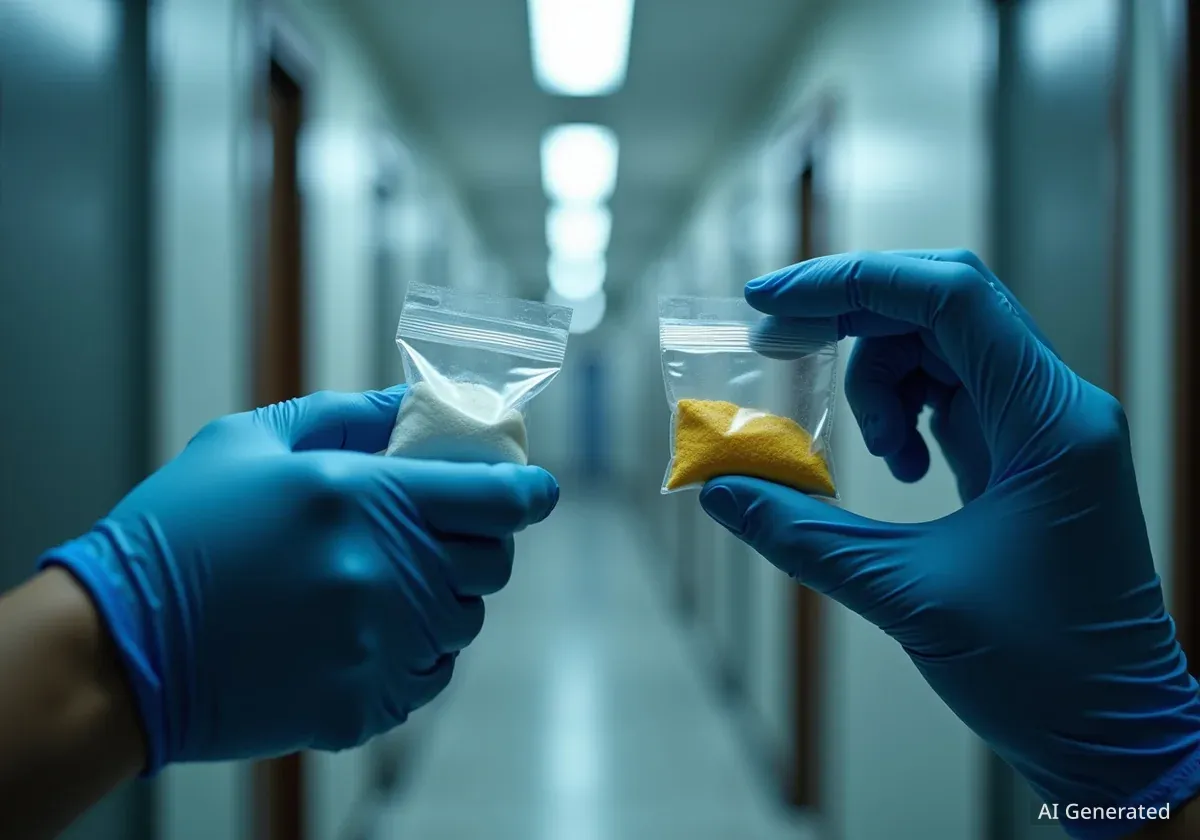Two correctional officers at Rhode Island's maximum security men's prison were revived with Narcan on Sunday morning after exposure to an unknown substance. The incident highlights ongoing concerns about drug smuggling into the facility and the safety of staff.
Key Takeaways
- Two prison guards in Rhode Island required Narcan after substance exposure.
- The incident occurred during morning recreation time at the Adult Correctional Institutions (ACI).
- Union officials report a significant increase in illicit drug smuggling, especially fentanyl, over 40 years.
- The Department of Corrections is implementing measures to prevent contraband.
- The substance involved in Sunday's incident is undergoing testing.
Correctional Officers Experience Symptoms
The incident took place at the Adult Correctional Institutions (ACI) in Cranston, Rhode Island, on Sunday. During morning recreation time, two officers began to feel faint. This happened while they were investigating an unknown aroma within the facility.
According to a Department of Corrections spokesperson, the officers received immediate treatment on-scene. Following initial care, they were transported to Rhode Island Hospital as a precaution. Both officers were discharged a few hours later, indicating a positive outcome despite the serious nature of the exposure.
Quick Fact
Narcan, also known as naloxone, is a medication used to rapidly reverse opioid overdose. Its administration in this case suggests the unknown substance may have been an opioid.
Union Highlights Increased Drug Smuggling
Richard Ferruccio, president of the Rhode Island Brotherhood of Correctional Officers, spoke about the event. He confirmed that the two guards were exposed to an unconfirmed substance and then received Narcan. Ferruccio stated that the smuggling of illicit drugs into the ACI has risen sharply.
He noted a significant increase in fentanyl smuggling in particular. Ferruccio, who has worked in corrections for over 40 years, estimates this increase to be tenfold since the start of his career. This long-term trend underscores a growing challenge for prison staff.
"The smuggling of illicit drugs into the Adult Correctional Institutions, particularly fentanyl, has increased tenfold since I started my career more than 40 years ago," said Richard Ferruccio, president of the Rhode Island Brotherhood of Correctional Officers.
Background on Fentanyl
Fentanyl is a powerful synthetic opioid. It is 50 to 100 times more potent than morphine. Even small amounts can be dangerous, making accidental exposure a serious health risk for correctional officers and others.
Emergency Response and Union Demands
The incident triggered a significant emergency response. Fire and rescue units from Cranston and neighboring communities responded to the prison. The situation was handled as a hazardous materials (hazmat) call, reflecting the unknown nature and potential danger of the substance.
Ferruccio also stated that correctional officers at the ACI are regularly exposed to various chemicals. The union is now demanding greater accountability for offenders involved in smuggling. This demand emphasizes the need for stronger deterrents and enforcement measures to protect staff.
Department of Corrections Responds
J.R. Ventura, a spokesperson for the Department of Corrections, issued a statement. He outlined the department's ongoing efforts to prevent contraband from entering its facilities. These measures include both technological solutions and disciplinary actions.
- Drug Detection Equipment: The department uses specialized equipment to identify illegal substances.
- Digital Mail System: This system aims to reduce physical contraband often hidden in traditional mail.
- Additional Disciplinary Sanctions: Inmates caught smuggling face stricter penalties.
The department expressed gratitude that the officers were discharged quickly. They also confirmed that the substance involved in the Sunday incident is currently undergoing testing to determine its exact nature.
The safety of correctional staff remains a top priority for the Department of Corrections. Their statement confirmed a commitment to vigilance and holding accountable those who endanger staff and the inmate population.
Broader Implications for Prison Safety
This event highlights a national issue regarding drug contraband in correctional facilities. The presence of potent substances like fentanyl poses a direct threat to the health and safety of both staff and inmates. The Rhode Island incident is a reminder of the daily risks faced by those working in prisons.
Efforts to combat smuggling require continuous adaptation. As new methods of concealment emerge, correctional facilities must update their security protocols. This includes investing in advanced detection technologies and implementing robust disciplinary frameworks. The ongoing testing of the substance will provide crucial information to inform future safety measures.
The incident serves as a call for increased attention to officer safety. It also underscores the importance of supporting correctional staff who work in challenging and often dangerous environments. Addressing the root causes of drug smuggling into prisons is essential for long-term safety improvements.





